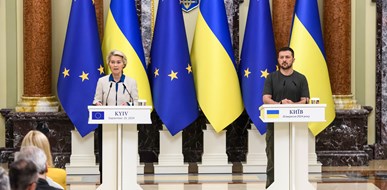[New blog post] European Union support to Ukraine through windfall profits
Published 28 October 2024
Photo: paparazzza - Ukrainian President Volodymyr Zelenskiy and European Commission President Ursula Von Der Leyen
A new blog post by Asser Institute researchers James Patrick Sexton and Victoria Kerr analyses the EU’s recent decision to send profits from frozen Russian Central Bank assets to Ukraine. Estimated to amount to around €3 billion per year, Sexton and Kerr argue that such windfall profits (or a large percentage of them) should be channelled towards victims of the conflict by, for example, contributing to the proposed compensation fund to be attached to the Register of Damage for Ukraine.
Background
Since the Russian Federation launched its full-scale invasion of Ukraine in February 2022, reconstruction in Ukraine is estimated to cost at least $486 billion and rising. Although around an estimated $300 billion worth of Russian Central Bank assets have been frozen by sanctions made in response to the full-scale invasion, international legal and political considerations have so far prevented the EU and allied states from confiscating them and using them to support Ukraine.
The EU’s windfall profits measure
In July of this year, the EU announced it was using the “extraordinary revenues” gained from the Russian Central Bank assets frozen within EU Member States to send to Ukraine. So far, €1.5 billion has been sent to Ukraine, largely for defence purposes, with an estimated €3 billion expected per year moving forward. The EU has argued that the funds do not belong to the Russian Federation and therefore the legal issues relating to outright confiscation of the Russian Central Bank’s assets do not apply.
The potential reparative value of the windfall profits measure
Following an analysis of the legal acts created by the EU to put the windfall profits measure into place, Sexton and Kerr suggest that the destination of the funds is reconsidered. Although recognising the utmost importance of continuing to support Ukraine’s defence, they argue that these particular funds (or a large percentage of them) should be funnelled directly towards those who have suffered from the war. For Sexton and Kerr, doing so would have a positive impact for victims – both practically and symbolically.
Read the full post here.
About the authors
James Patrick Sexton is a PhD researcher in public international law at the T.M.C. Asser Instituut and the University of Amsterdam. At the T.M.C. Asser Instituut, James is a member of the research strand: 'In the Public Interest: Accountability of the State and the Prosecution of Crimes'. His research interests lie within the law of armed conflict, international criminal law, unilateral sanctions, and the (international) legal aspects of countering terrorism. Additionally, James is the Managing Editor for the Yearbook of International Humanitarian Law.
Victoria Kerr is a Consultant and Associate Fellow to the research strand 'In the public interest: accountability of the state and prosecution of crimes. She works primarily on the MATRA-Ukraine project ''Strengthening Ukraine’s Capacity to Investigate and Prosecute International Crimes", a joint initiative of the Asser Institute and Global Rights Compliance (GRC), and the Restoring Dignity and Justice project. Victoria's research interests lie in international criminal law, international humanitarian law, and international human rights law, as well as sanctions, asset confiscation and reparation.
Read more
[Panel discussion] Secondary sanctions and the international legal order
What are secondary sanctions? How do states and the European Union deploy secondary sanctions as tools of foreign policy? Does international law regulate the imposition of such sanctions? Please join us on the 5th of November for a free event exploring the multifaceted legal implications derived from the rising adoption of secondary sanctions on the occasion of the recent publication of the Cambridge Handbook on Secondary Sanctions and International Law (2024), edited by professors Tom Ruys and Cedric Ryngaert, and Felipe Rodríguez Silvestre. Read more.
[Conference] Strengthening Ukraine’s efforts to investigate, prosecute, adjudicate and report on international crimes
Since Russia's full-scale invasion of Ukraine in 2022, there is a global surge in efforts to hold perpetrators accountable for committing international crimes. The T.M.C. Asser Instituut and Global Rights Compliance have been supporting Ukraine's justice system for 4 years via the MATRA-Ukraine project. A conference on 19 November will conclude the project by reviewing key outcomes and offer recommendations for the pursuit of accountability in Ukraine. Read more.
[Lecture] The Register of Damage for Ukraine: Towards reparation for victims?
The UN General Assembly Resolution on the “Furtherance of remedy and reparation for aggression against Ukraine”, adopted on 14 November 2022, recognised that the Russian Federation must be held to account for its violations of international law in Ukraine, including by way of payment of reparation. In response, the Register of Damage for Ukraine was established on 17 May 2023 by the Council of Europe, 40 states, and the European Union. To provide an informed perspective on this critical issue, this lecture takes stock of the developments surrounding the Register of Damage at this critical stage and tackles pertinent questions regarding a comprehensive approach to addressing the harm suffered by victims. Watch the lecture.

